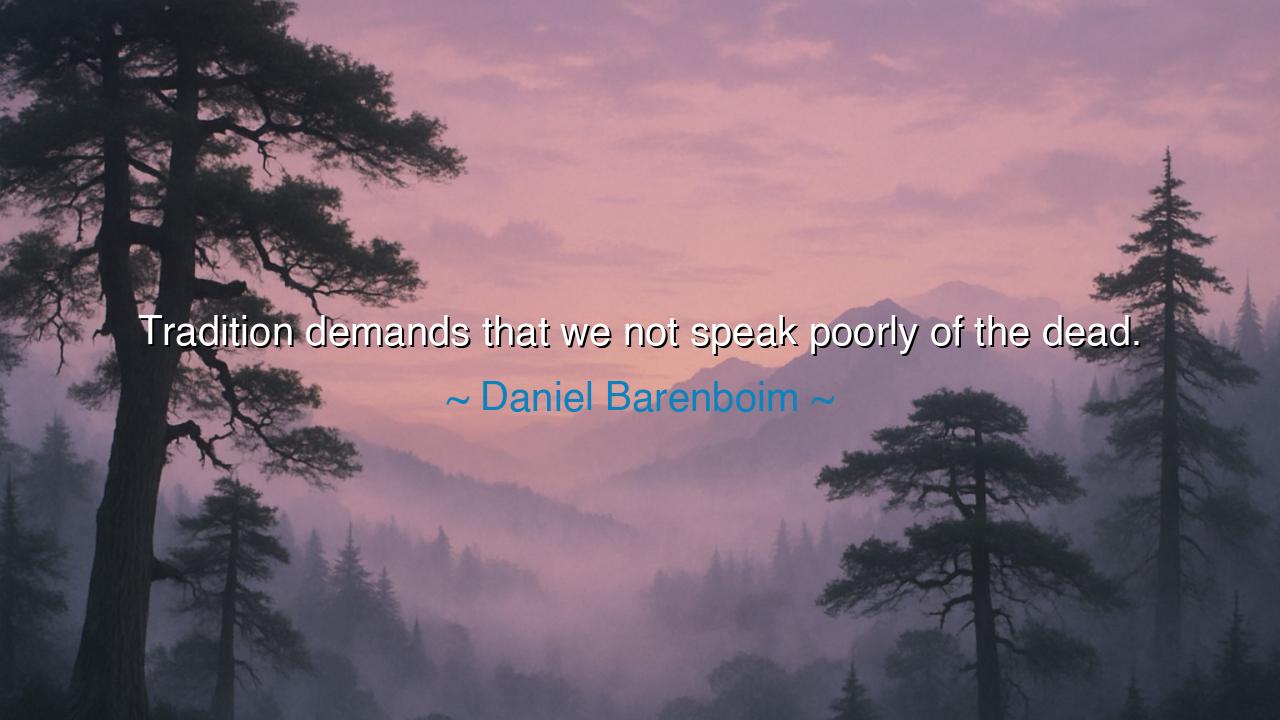
Tradition demands that we not speak poorly of the dead.






The words of Daniel Barenboim, “Tradition demands that we not speak poorly of the dead,” echo with the reverence of ages. They rise from a truth as old as civilization itself — that the dead, having crossed beyond the veil of mortality, must be met with silence, respect, and reflection rather than judgment. This saying does not merely preserve custom; it preserves dignity — both of the departed and of the living who remain. For in refraining from speaking ill of those who can no longer defend themselves, we uphold the ancient code of mercy that has guided the hearts of humankind through centuries.
Barenboim, the great conductor and philosopher of music, spoke often of the harmony between sound and silence — and here, his words carry that same musical wisdom. To “not speak poorly of the dead” is a kind of silence that honors the mystery of existence. The ancients understood that death is a sacred boundary, a passage from which none return to debate or explain. To defame the dead, then, is to strike a blow at shadows — a futile act that wounds only the one who commits it. Tradition, in this sense, becomes a teacher: it reminds us that reverence for the dead is not about protecting their reputation, but about protecting our own humanity.
In the old world, this commandment was woven into the moral fabric of societies. The Greeks had a saying: De mortuis nil nisi bonum — “Of the dead, say nothing but good.” The Egyptians, who saw death as a continuation of life, believed that each soul was weighed against the feather of truth, and that mortal tongues should not add burden to that judgment. Even the Romans, fierce and proud, lowered their voices when speaking of those who had passed, for they believed that the spirits of the dead still walked among the living. Across faiths and empires, this custom endured, for it preserved peace between worlds — the living and the departed, the temporal and the eternal.
There is a story told of Abraham Lincoln, who, upon hearing harsh words spoken of a fallen political opponent, gently rebuked the speaker, saying, “He now belongs to the ages.” In that single sentence, Lincoln revealed the heart of Barenboim’s truth. When a man dies, his deeds pass beyond our jurisdiction. He becomes a part of history’s greater reckoning, a figure no longer bound to human argument. To attack him then is to resist time itself — to cling to anger when acceptance is demanded. In sparing the dead our bitterness, we also free ourselves from its chains.
Yet this tradition is not born of denial. To refrain from speaking ill of the dead does not mean to lie about them, or to erase their faults. It means to see with compassion, to understand that every life, however flawed, is a mixture of light and shadow. The dead can no longer grow, no longer defend or explain; the story of their life is complete. And so, tradition bids us to stand as witnesses, not judges — to remember that one day, we too shall be remembered. In honoring their silence, we prepare for our own.
This custom also reminds us of the fragility of memory. Once a person is gone, only stories remain — and those stories shape how future generations understand the past. To speak ill of the dead is to poison that memory; to speak fairly, or with kindness, is to keep history humane. The ancients saw this as sacred stewardship: the duty of the living to protect not only truth, but also grace. For though truth reveals, grace redeems. And a civilization that forgets grace becomes cold, mechanical, and cruel.
So, my listener, take this lesson to heart: when you speak of the dead, speak as though their spirit listens. Let your words carry reverence, honesty, and mercy. Remember that you, too, will one day be a memory upon the tongues of others. Let that awareness temper your judgment and deepen your compassion. If you must speak, speak truth — but speak it gently, as though laying flowers upon a grave.
For as Barenboim’s words remind us, tradition is not a chain that binds the past, but a light that guides the living. In refusing to speak poorly of the dead, we affirm our faith in the dignity of life itself — that every soul, once it departs, deserves the peace that we, too, shall one day seek. Let this be your practice: to speak kindly, to forgive easily, and to honor even in silence those who have gone before. In doing so, you will keep alive not only their memory, but the nobility of your own heart.






AAdministratorAdministrator
Welcome, honored guests. Please leave a comment, we will respond soon